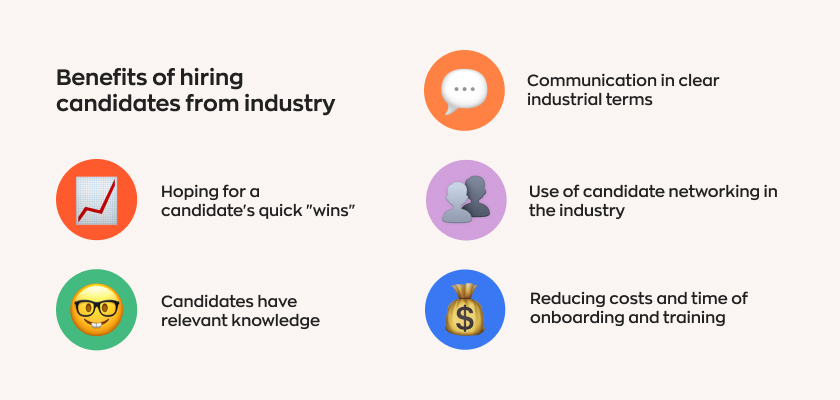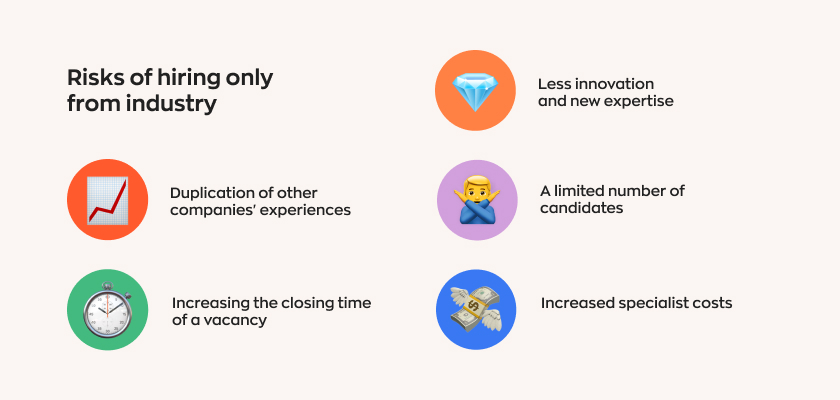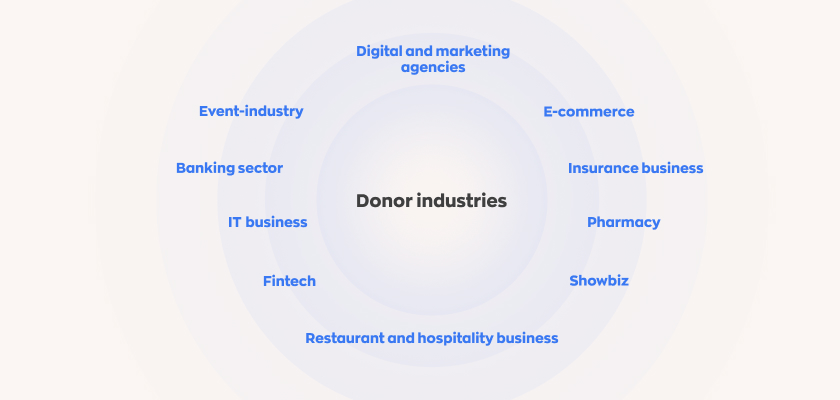Cross-industry recruitment
From the beginning of the pandemic to the present day, iGaming has been booming, with companies inventing new ways to communicate with players, developing products, and exploring foreign markets. New projects require additional people, and recruiting a solid team is becoming a significant concern for business leaders. At the same time, gambling companies continue to limit the range of potential candidates, making experience in the industry a requirement.
Let's be honest: it's not always easy to convince a hiring manager that hiring from different industries is the best way to increase the number of candidates, let alone attract new expertise and ideas. Let's look at the challenges of hiring from related industries, their benefits and give some advice to candidates on how to get into the fast-growing and lucrative gambling industry without experience.
Why companies prefer candidates from their industry:
Naturally, there is a certain level of comfort in hiring experienced professionals from the field, and industry barriers exist for a reason. First and foremost, companies expect that such specialists are guaranteed to have some knowledge of the business, require less time to learn and adapt, and will quickly bring the desired results and use the contacts previously accumulated.

What are the risks of requiring industry experience for a company:
Finding people only from the gambling industry, apart from the obvious problem of a limited pool of candidates, brings other, non-overlapping issues.
Firstly, recruiting people with similar experience and identical existing knowledge to the company will lead to results close to what they already are. By attracting such candidates, you minimize the opportunity for innovation. Second, cross-industry hiring saves the budget. Often, the right specialist with experience in gambling is poached from competitors or partners, and the financial expectations of such a specialist can be two or three times higher than the budgeted amount. Is industry hiring always justified to save time on learning the terms and rules of the game? And how long would it take to find the right specialist? There was a case where a company spent over six months searching for a CMO only because they needed gambling expertise, but there were simply no specialists available on the market. Candidates with relevant experience and good potential from fintech, pharmaceuticals, and digital agencies were not considered.

Donor industries for gambling:
You can find equally talented individuals with similar experience and expertise fresh to the company in related industries. The key is to understand which industries apply to your query. For example:
- Candidates with experience in digital agencies, pharmaceuticals, tobacco, and alcohol industries, do well in marketing positions with B2C operators.
- Candidates from the tourism, event management, and hospitality industries performed well in client support for players (especially during the pandemic, showing great interest in the work and motivation for apparent reasons).
- B2B sales positions will be handled by the majority of B2B salespeople (perhaps except candidates from enterprise and monopoly companies)
- Professionals from the banking industry successfully fill AML/Fraud/Verification positions.

How to open doors to gambling professionals from other industries:
At the recruitment stage: A key recommendation is to shift the focus from assessing the applicant's "past jobs" to applying their knowledge and skills to your company and the candidate's potential. Focus on core competencies and achievements. Hiring managers should focus on behavioral rather than technical competencies. If a candidate has examples of cross-industry transition in their career, this indicates an ability to adapt, learn, and absorb new information. Interviewers should analyze the candidate's experience relating to another industry and assess its applicability to the gambling field.
During the onboarding phase: Organise an internal training program to immerse yourself in the industry, including understanding your role. Employees who have not previously worked in the sector must integrate into an unfamiliar environment as quickly as possible. The process does take longer, but as our clients say, the investment is worth it.
What are the benefits of cross-industry recruitment:
- A broader pool of talent: access to people in new industries and where your competitors are not yet looking;
- Fresh perspectives: Talent from different sectors ensures the introduction of new ideas and fresh approaches;
- The salaries of specialists in related industries may be lower;
- Positions close faster, and even with time to train candidates, they begin to deliver results faster.
"Stand out. Businesses' ability to adapt quickly and open up to new people and new ideas will lead to success."
What should candidates who are ready for a cross-industry transition do?
It is essential to analyze their skills and achievements and see them apply to a particular position. If the candidate is aware of his self-worth, his lack of experience in the new industry won't be an issue. He should talk directly about the concrete added value he can bring to the company and his fulfillment.
Once you have decided to change the field or industry in which you work, follow these steps:
Step 1: Research the industry: Read articles, watch interviews, and research as much as you can about the niche you are interested in. What technology is needed in the industry? What kind of foreign language? Certifications, skills, country presence status?
Step 2: Prepare for the interview diligently: Going to the company for your first interview, at a minimum, familiarize yourself with its website and social media, look at its key employees. What plans the company has, what it says about itself in the news, and what the media says about the company. These are all essential things to know before the interview.
Step 3: Reduce the differences, find the similarities. For example, the tobacco, pharmaceutical, and financial industries are heavily regulated, as is gambling. So people with experience in these industries are more compliance-oriented, making the transition easier. Candidates from digital are used to creative and unconventional solutions (which is necessary for marketing). Employees in telecom companies have enormous competition - their knowledge is applicable in retention. Fintech sales people struggle to reach the end customer regularly - this experience applies to performance marketing and campaign management in gambling. Talk about the qualities that have helped you succeed in your current industry and how you can be of service to that company on their journey together to achieve the desired results.
Step 4: Speak openly about what interests you about the industry.
An interested applicant always stands out in a market where companies fight and persuade candidates to move to them. State in your cover letter why you are interested in gambling in general and a particular company.
Tips for candidates
- Find points of convergence between the industries;
- Highlight the similarities between your current position and the vacancy;
- Decide WHY you want to go into gambling;
- Be aware of industry trends and developments;
- Prepare yourself thoroughly for the interview.
In conclusion, Talentgrator has seen an intense growth and scaling of companies whose executives are open to professionals from other industries, always looking for new ideas and technologies, and making decisions quickly and efficiently.
If you are on the lookout for a cherished member of your team, write to us! If you want to get into gambling and our article has inspired you to make the cross-industry transition, we would love to see your CV:)